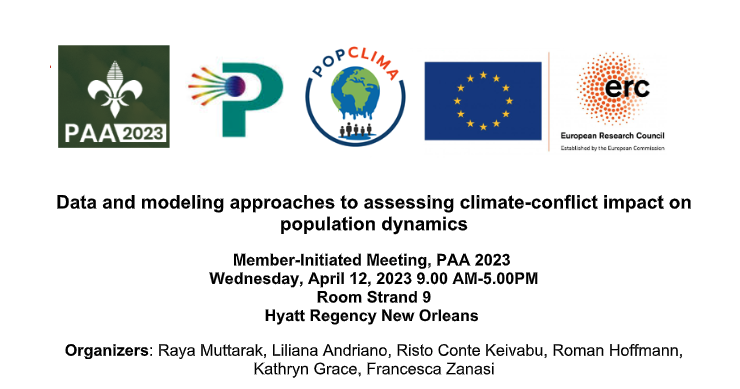
12 Apr 2023 09:00 AM - 12 Apr 2023 05:00 AM
Room Strand 9 Hyatt Regency New Orleans

Organizers: Raya Muttarak, Liliana Andriano, Risto Conte Keivabu, Roman Hoffmann, Kathryn Grace, Francesca Zanasi
The ongoing conflicts in Ukraine, Ethiopia, Nigeria, Syria, and Afghanistan, to name a few, coupled with small- and large-scale climate change impacts (e.g., seasonal variability, extreme events, and long-term changing conditions) have the potential to strongly affect human health, well-being, livelihoods, and social systems. Climate change impacts include
extreme events with a large spatial extent like hurricanes and floods, but they also include more local experiences like drier conditions affecting crop yields, waterborne disease outbreaks or more frequent and intense heat waves. The effects of these events can be exacerbated when climate change impacts interact with conflict. As part of the activities of the IUSSP Scientific Panel on Population dynamics under global conflict and climate change, the workshop aims at providing researchers with theoretical and analytical tools to assess how conflict and climate change affect a wide range of demographic outcomes, such as health, fertility, mortality, and migration. The one-day workshop comprises four parts that reconcile theoretical approaches and hands-on activities. First, we provide an introduction to and overview of demographic research on conflict, climate change, and population dynamics. Second, an overview of the demographic, climate and conflict data sources available for research in this field, coupled with a practical session on linking spatial conflict and climate data (e.g. ACLED and ERA5 respectively) with georeferenced micro-level data (e.g. Demographic and
Health Surveys) using the software R. Third, the afternoon session will be devoted to critically approach conflict and climate change measurement, with reasoning on operationalization and causal inference. Finally, the workshop will conclude with a practical session on statistical modelling with the software R. The participation is free of charge. Please fill in the registration form: https://forms.gle/T7xqno8ZVJ1omh3k8
For further information, please contact: Francesca.zanasi5@unibo.it
Detailed program:
Morning (9:00-13:00 with coffee break)
Introduction and overview of research on climate, conflict and population dynamics – Raya
Muttarak (University of Bologna)
Introduction to the use of DHS data, conflict data and climate data in population research –
Liliana Andriano (University of Southampton) & Risto Conte (MPIDR)
Hands-on workshop – Liliana Andriano (University of Southampton) & Risto Conte
(MPIDR)
Lunch break (13:00-14:00)
Afternoon (14:00-17:00 with coffee break)
Theoretical concepts and mechanisms on climate-conflict-population dynamics nexus; How to best measure and operationalize climate effects -- Kathryn Grace (Minnesota Population Center) Methods and modeling approaches to assessing the climate-conflict impact on demographic outcomes – Roman Hoffman (IIASA) Hands-on workshop – Roman Hoffman (IIASA)
Pic 1: All the participants (for the considerable 8h effort), and all the people "behind the scenes" in the workshop at PAA2023 (12/04/2023).
Pic 2-3: The first session started with an overview of climate-conflict-population dynamics by Raya Muttarak (University of Bologna).
Pic 4-5: Second session by Risto Conte (MPIDR) and Liliana Andriano (University of Southampton) with intro to climate&conflict data sources followed by hands-on lab with R.
Pic 6: In the afternoon session, Roman Hoffman (IIASA) talked about conceptual measurement issues and some modeling approaches to study climate/conflict&pop dynamics.